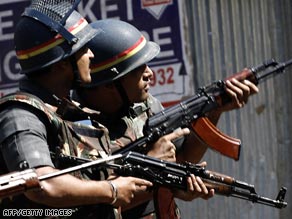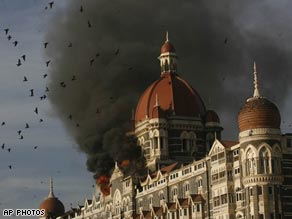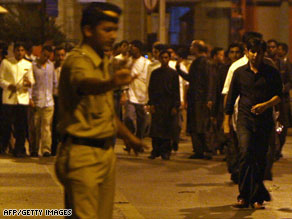Saturday, November 29, 2008
Mumbai attack : More News

Fire fighter rescues a guest of the Taj Hotel in Mumbai, India, Thursday, Nov. 27, 2008. Teams of heavily armed gunmen have stormed luxury hotels and other sites in coordinated attacks across India's financial capital, killing at least 82 people and taking Westerners hostage.
Victims Speak Of Night Of Terror In Mumbai
MUMBAI, India — Western visitors and Mumbai residents shuddered as they spoke of a night of terror, ducking under tables at luxury five-star hotels as staff members locked restaurant doors at the first rattle of gunfire and explosions in the lobby below.
Not far away, army commandoes in battle-ready camouflage uniforms battled attackers in black shirts and jeans carrying shoulder bags filled with ammunition at Mumbai's main railway station, which was filled with commuters waiting to catch trains home.
Twelve hours after the first shots were fired at about 10 p.m. at a busy Mumbai cafe, the terror attacks continued Thursday inside two of the city's best-known and most opulent hotels where terrorists still held hostages.
"We were at dinner when we heard shots fired. There was gunfire and explosions. We stayed on the floor, many were lying under tables, under furniture, and the hotel staff told us to be quiet," said Cheryl Robinson, a British tourist who was trapped inside Mumbai's Taj Mahal hotel with two friends. "The hotel staff were stupendous. They locked the doors and warned us to sit tight."
She said restaurants and rooms were flooded with water after a pipe burst in the chaos of the gunshots and blasts. "We lay down in the water. We could hear the sound of people running outside. It was terrifying."
Seven long hours later, a barefoot Robinson shivered as she stood outside the burning but still majestic stone-columned hotel that belched out black smoke from shattered windows. Soldiers and firefighters helped her and several others to climb down ladders and escape the blazing edifice as the firing continued inside.
A clutch of weeping tourists from Spain, Italy and Britain, also barefoot, huddled together holding bottles of water and haversacks. They waved away journalists eager for news.
At another Mumbai landmark, the Chattrapati Shivaji Terminus railway station, Nasim Inam's hands shook as he spoke of seeing commuters mowed down while walking to catch the late trains home.Four young men carrying big guns and wearing black T-shirts and blue jeans rushed in, Inam said. "They just fired randomly at people and then ran away. In seconds, people fell to the ground."
Sobbing and shaking his head, he said the attackers were 25 years old at the most.
"They were so young. They were young boys," said Inam. "I was standing behind. I was just behind. If they had turned around, it would have been me."
Just a few miles (kilometers) away, eyewitnesses said gunmen hijacked a police van then opened fire on crowds that had collected near two hospitals close to the police headquarters.
"We felt the ground shake and heard the explosions," said Manish Tripathi, at a police cordon near one of the hospitals. "We heard a car speed up behind us, it was a police van, but the men inside were firing at us."
He said in seconds people around him were shot at. "Men were screaming that they had lost their fingers. There was blood all over," said Tripathi who escaped unhurt. "Some were shot in the leg, some on the shoulder or hand. I feel they are still screaming."
Inside the two Mumbai hotels and the railway station, green uniformed soldiers in helmets took over from the khaki-uniformed police who moved out to patrol the streets and warned residents to stay indoors.
The state government has ordered schools and colleges closed Thursday.
Opposite the multistory Oberoi hotel, a tense college student Preet Desai paced on a deserted promenade as dawn broke. He said a friend's father was inside the hotel at a business meeting when shots were fired.
"My friend is shattered. His dad is not answering his cell. What do we do?" said Desai. "Do you know anyone in the hotel who can give us information, any information?"
Read more...Pictures of Mumbai Attack


Armed security personnel wait outside the Taj Mahal hotel in Mumbai on Thursday.
Luxury hotel transformed into war zone: witness
Meanwhile, Canadians relayed their harrowing tales of how they escaped when gunmen descended on the two hotels, widely popular with tourists and among India's most famous.

Police officers inspect a car after they shot dead two suspected gunmen in Mumbai late Wednesday night.
Raynor Burke of Newfoundland and Labrador was in the lobby of the Taj Mahal hotel shortly after arriving in Mumbai when pandemonium broke out.
At first he dismissed the shots ringing out as firecrackers, but then saw young men in black T-shirts firing automatic weapons into the crowds.
"They were literally just emptying round after round into a crowd of people."
Burke fled to the swimming pool area only to find more gunmen shooting people, mostly women, and trying to corral guests.
"It went from being the nicest hotel I had ever seen to a war zone," said Burke. He then ran up a stairwell behind a police officer, but lost him and then dove through a glass window.
"I have no idea how high it was, to be quite honest," said Burke. "I mean, at that point, I was already full of blood. I had fallen once by the swimming pool and the pool — there was blood everywhere."
Burke said he hid out in an alleyway for an hour and a half as the shooting and explosions continued in the 565-room luxury hotel.
 Read more...
Read more...
Thursday, November 27, 2008
terror attack on INDIA
Gunmen who arrived by boats launched attacks on at least seven locations in Mumbai, India, on Wednesday night, killing more than 120 people, authorities say.

Indian soldiers take position outside Chabad House, the scene of one the Mumbai attacks.

Fresh explosions have been heard at the Taj Mahal hotel, where police are trying to free hostages.
 An Indian police officer directs people leaving the Taj Mahal after gunmen attacked the hotel overnight Wednesday.
An Indian police officer directs people leaving the Taj Mahal after gunmen attacked the hotel overnight Wednesday.
By Friday morning, authorities believed militants still were in two luxury hotels and a Jewish center in the city.
The following is what is known about the attacks:
• Gunmen arrived by boats at the Mumbai waterfront near the Gateway of India monument on Wednesday night, police said. The gunmen hijacked cars, including a police van, and split into at least three groups to carry out the attacks, according to police.
• One group headed toward the Cafe Leopold, a popular hangout for Western tourists, firing indiscriminately at passers-by on the street. The group then opened fire and lobbed grenades at the Chhatrapati Shivaji Terminus railway station, authorities said.
• As police rushed to the scene of the attacks, gunmen attacked the Cama Hospital for women and infants. Several people were killed at the hospital, and a standoff there lasted until Thursday morning.
• Two other groups attacked the Oberoi and Taj Mahal hotels, taking hostages there, police said.
• Gunmen also took hostages at the Chabad House, where several Jewish families live, police said. Rabbi Gavriel Holtzberg, the city's envoy for the community, was being held inside with his wife, a member of the Hasidic Jewish movement said. Gunmen and hostages still were believed to be in the house Friday morning.
• Police said gunmen fired indiscriminately from the Chabad House. Stray bullets killed a couple in their home and a 16-year-old boy who stepped outside, police said. Two women and a child escaped from the building Thursday, a government official says.
• At the hotels, hostages or people who were trapped left at various times Thursday and Friday. Commandos entered both hotels, trying to flush out militants and rescue others.
• By Friday 12:30 a.m. IT, one gunman remained in the Taj hotel, and two others remained at the Oberoi hotel, the director-general of the National Security Guards said. At 1 a.m., one gunman was killed at the Oberoi hotel, the official said. He said he couldn't say for sure how many gunmen were still at the Oberoi.
• An undetermined number of nonmilitants remained inside the hotels Friday morning, NSG director-general J.K. Dutt said. "There are some of them inside the rooms, and they are not prepared to open the doors," he said. "Probably they are fearing that it might not be an innocent."
• Fire brigades battled fires at both hotels. By early Friday, it appeared what had been a major fire at the Oberoi had been extinguished.
• By Friday morning, 125 had been killed in the attacks, including at least six foreigners, authorities said. An Italian and a Briton were among the confirmed dead. Another 327 people were wounded, including seven Britons, three Americans and two Australians.
• Authorities found 8 kilograms (17 pounds) of RDX, one of the most powerful kinds of military explosives, at a restaurant near the Taj, indicating that the attackers may have been planning more violence.
• The Indian navy, stepping up patrols on the country's western coast after the attack, was questioning the crew of the MV Alpha, a ship detained with the help of the Indian coast guard, British authorities said. The authorities said they believe the attackers' boats came from this ship, and that they believe the ship is from Karachi, Pakistan.
• Karachi police say they have no evidence the attackers departed from their city.
• State media Press Trust of India, citing Union Cabinet Minister Kapil Sibal, reported the gunmen had worked for months to prepare, even setting up "control rooms" in the two luxury hotels that were targeted. Read more...
















